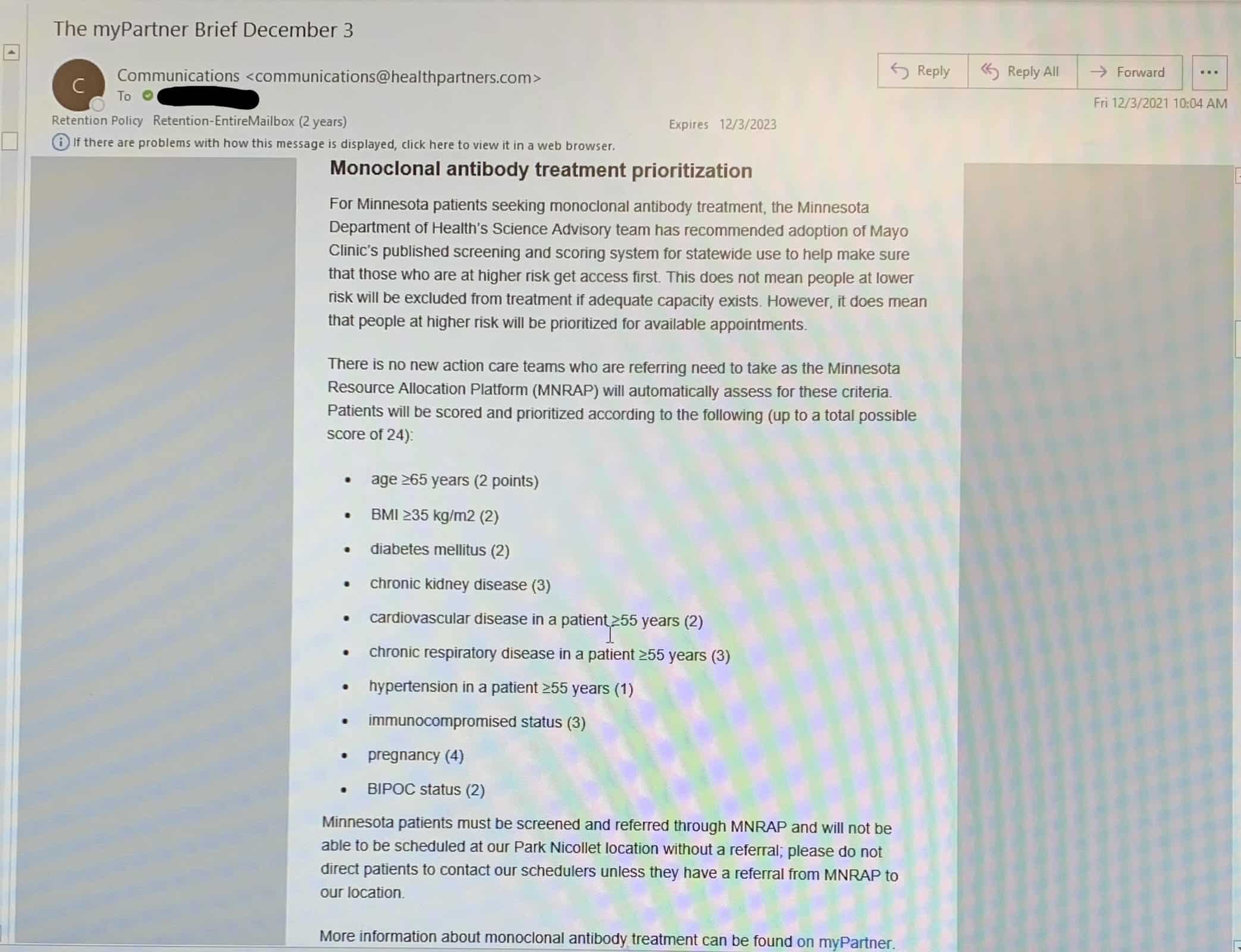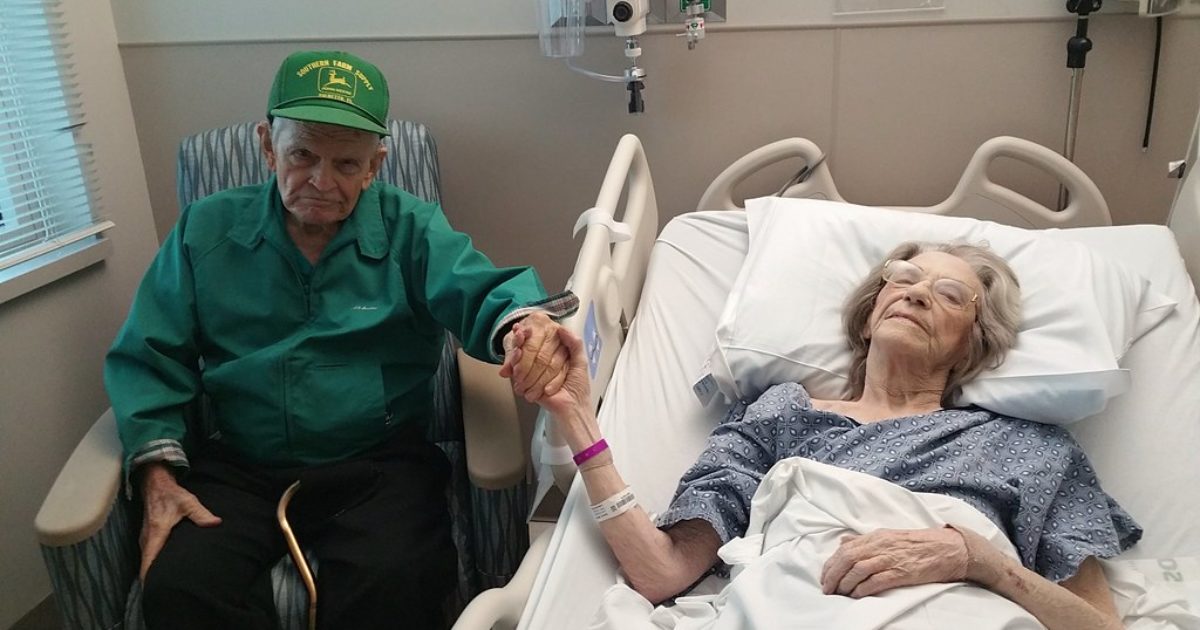The Minnesota Department of Health (MDH) published a document that blatantly discriminates against white individuals when prioritizing which patients receive monoclonal antibodies.
Monoclonal antibodies are made in a laboratory and mimic natural antibodies a person’s body makes to fight diseases. They’ve been used to treat active COVID-19 cases and as a preventative for healthy individuals.
Due to the success of monoclonal antibodies in treating COVID-19, the increased demand has caused supply to run low across the country. Some patients have been turned away when attempting to access monoclonal antibodies.
Per KFYR:
Prior to September, state health departments and hospitals could purchase their own supply of the treatment, but that changed four weeks ago when the federal government stepped in and began allocating the supply.
“Those specific antibodies have been allocated to the 50 states based on what’s occurring within the states in terms of utilization but also the number of active cases,” said Tim Wiedrich, section chief for the Health Resources Response Section with the North Dakota Department of Health.
With demands high across the country and manufacturers not being able to keep up, states including North Dakota are seeing massive shortages.
“For the most part, most people have been able to obtain it. Now there are times when they have had to drive some distance in order to get to a facility that has it or facilities have shifted product to get the monoclonal antibodies to the where the patient is at. Again, there have been some patients that have not been able to get it,” said Wiedrich.
In Minnesota, hospitals have received instructions to prioritize non-white patients when determining who has access to monoclonal antibodies.
The MDH document titled “Ethical Framework for Allocation of Monoclonal Antibodies during the COVID-19 Pandemic” states that “race and ethnicity alone, apart from other underlying health conditions, may be considered in determining eligibility for mAbs [monoclonal antibodies].”
The Minnesota Department of Health has published a document which instructs hospitals to discriminate against white people by ensuring non-white patients have priority access when it comes to potentially life-saving COVID-19 treatments.😡😡🤬
— American Islandman (@N76247476Man) December 27, 2021
The Minnesota Department of Health has published a document which instructs hospitals to discriminate against white people by ensuring non-white patients have priority access when it comes to potentially life-saving COVID-19 treatments.https://t.co/xA60T6yrq0
— Paul Joseph Watson (@PrisonPlanet) December 27, 2021
The Minnesota Department of Health has issued guidance to hospitals urging them to discriminate against white people by ensuring priority access for non-white patients when it comes to the availability of life-saving COVID-19 treatments.
READ MORE: https://t.co/RN7C0Za7kJ
— Rebel News (@RebelNewsOnline) December 28, 2021
Alpha News explains the MDH allocation process:
Minnesota’s solution is to ration mAbs based on various health factors, each assigned a different score. The maximum number of points a patient can amass is 24. Antibodies will be distributed based on these scores (highest numbers receiving treatment first) where supplies run low.
Here are the factors and their associated values:
- Being BIPOC (2 points)
- Age 65+ (2 points)
- BMI 35 kg/m2 and higher (2 points)
- Diabetes mellitus (2 points)
- Chronic kidney disease (3 points)
- Heart disease in patients ages 55+ (2 points)
- Chronic respiratory disease in patients ages 55+ (3 points)
- Hypertension in patients age 55+ (1 point)
- Immunocompromised (3 points)
- Pregnancy (4 points)
Based on this scoring metric, if two pregnant women, one black and the other white, visited a hospital with limited mAbs supplies, the black woman would receive priority because her score would be six, but the white woman’s score would only be four.
This isn’t a theoretical model either; it’s apparently being used in Minnesota hospitals.
HealthPartners controls hospitals and clinics across the state and is responsible for serving 1.2 million patients per year. Alpha News obtained an email that appears to show the company directing its employees to use the scoring system, racial element included, to decide who gets mAbs treatment during shortages.
“This [system] does not mean people at lower risk will be excluded from treatment if adequate capacity exists. However, it does mean that people at higher risk will be prioritized for available appointments,” the email explains.
Alpha News shared a screenshot of the Health Partners email:

According to the MDH document, the metric system is adapted from Mayo Clinic’s published Monoclonal Antibody Screening Score (MASS).
Dave Blount wrote in Moonbattery:
As you might expect in a healthcare system increasingly dominated by the government, monoclonal antibodies have been rationed. In Minnesota, who gets them is determined by a point system. Being anything other than white counts for the same number of points as being 65 years or older.



Join the conversation!
Please share your thoughts about this article below. We value your opinions, and would love to see you add to the discussion!